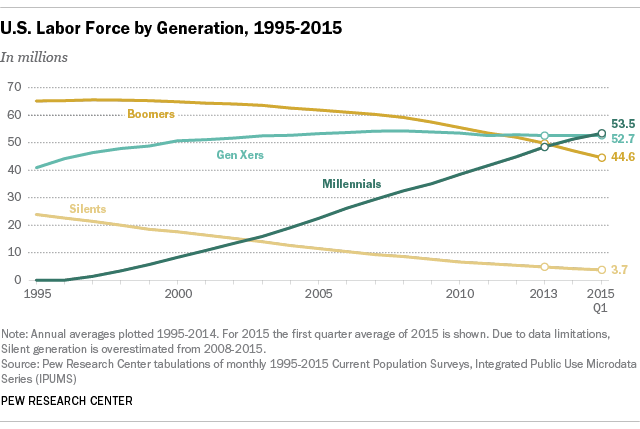
In the connected age, it’s harder and harder to maintain a healthy work life balance. It’s just too easy to text co-workers or check company email after hours. So easy that last year, France proposed a new law that would give workers the “right to disconnect” after work hours.
It’s hard to imagine a law like that even being proposed in the U.S. where employees are recognized for overworking themselves due to a cultural bias toward “working hard.”
Researchers refer to this as the myth of the “ideal worker.”
However, with more millennials at work, old expectations may need to shift. While a “tow the company line” mentality was accepted in previous decades, millennials approach the workplace with the mentality, “What’s in it for me?”
In a recent study, Gallup found that millennials are the generation most likely to switch jobs and be on the lookout for new opportunities.

Ideal Worker Myth
This mythical worker has its origins in the 1950s, when “company men” were able to have a single-minded focus on work––a focus for which their wives, who tended to the home and children, were to thank.
Since the 1950s, the types of work-family arrangements in the U.S. has shifted, due mostly to the increased number of women in the workforce. According to the Bureau of Labor Statistics, 48 percent of married couples are in dual-income households. There are also more working mothers than working fathers in the U.S.
Should Employees or Employers Change?
Despite changes in our workforce and family realities, the “ideal worker” myth persists. Erin Reid, a Boston University professor, recently studied a global consulting firm with a culture that expected work to come ahead of other life responsibilities. Reid found that the majority of the employees at the firm were dissatisfied.
Their dissatisfaction led them to develop strategies for resisting the firm’s ideal-worker expectations. Two camps emerged: those who attempted to “pass” as devoted workers and those who spoke up.
Faking It
In order to “pass” as a devoted employee, many individuals (and sometimes entire teams) made small, under-the-radar changes that allowed them to work less.
The firm disapproved of employees that spoke up and asked the firm for help in pulling back. The “ideal worker,” it seems, is still what employers expect. Many at the firm who spoke up received harsh penalties and were marginalized.
Clinging to Old Ideals
Surprisingly, when Reid reported her findings to the firm, she received two responses from the organization’s leadership. First, they insisted that they didn’t want employees whose work devotion didn’t meet their standards. Second, they asked if Reid could help them figure out how to get more of their employees to “pass.”
Instead of encouraging a more reasonable work life balance, the firm wanted to stick to business as usual. Reid concluded, “The broader implication–that the organization itself might alter its expectations–was lost.”
Millennials Want Work Life Balance
There may be hope for a better work life balance for U.S. workers. That hope is Millennials.
In 2015, the Millennial generation became the largest portion of the U.S. labor force according to Pew Research Center.
According to the aforementioned Gallup study, millennials want “change” in the workplace. They don’t want to hear “that’s the way it has always been done.” This generation more than any other wants to be free of old workplace policies and performance management standards. And, they expect leaders and managers to adapt accordingly.
Harford surveys millennials annually to better understand what this generation wants in the workplace. Millennials consistently cite flexibility as something they value. In 2014, 47% of millennials surveyed cited work life balance as an issue of key importance to them. In 2015, 43% of millennials surveyed suggested that companies could attract employees by providing flexible work schedules.
Connecting with the Connected Generation
Gallup found that millennials do not feel close ties to their jobs and only 29% of employed millennials are engaged at work. So, how can employers connect with the most connected generation?
Employers should start by shedding old ideals and aligning their expectations to the new workplace realities. Team members that work remotely are replacing the “company man” and that’s the way millennials like it. They want flexibility, a sense of purpose and to be given opportunities to grow and learn. “Passing” isn’t an option for millennials.
It makes sense that the most connected generation wants to feel a personal connection to their work, but that would mean a shift from “ideal worker” to empowered individual. Are companies ready for that?

